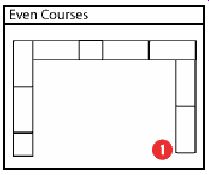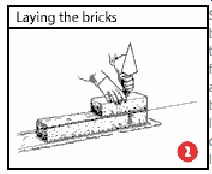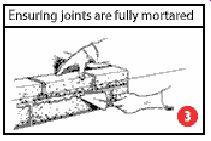Skill level:
Building a barbecue is a relatively easy project, requiring a minimum amount of skill and DIY knowledge.
Safety:
The main safety factors are the dangers of using sand and cement as this contains lime and can cause burns or irritation to the skin and eyes. It is important that you always wear goggles and gloves when handling cement and when cutting bricks.
Intro:
More of us are swapping our frying pans and ovens for a barbecue. Not only is it the healthy option, but it's also a fun way to cook when the sun is shining.
If you want to make the barbecue a more permanent feature in your garden the ideal solution is to build your own. A well built barbecue will provide you with hundreds of char-grilled meals, with the obvious advantage of not having to worry where to store it every winter.
Our guide provides step-by-step instructions for building a basic brick barbecue structure. To ensure that you use your barbecue safely we've also included general safety do's and don'ts, and the seven golden rules for barbecuing.
2 - Building the base
Begin by digging a small trench, approximately 12 inches wide by 9 inches deep, make it in the shape that you want your barbecue. Compact the bottom of the trench by stamping it down before filling it in with cement; you will need to use coarse cement, this can be bought ready-mixed so all you have to do is add water.
Mix the cement on a board measuring at least 3 feet square.
Pour the dry concrete mix in the center of the board making a hole in the top like a volcano. Pour water from a watering can into the center of the heap. Using a shovel, scoop dry mix from the base of the heap and add it to the center until it is full.
Make another hole in the top and repeat the process until the mixture is thoroughly wet and a uniform color. Using the shovel with the face towards you chop into the pile, as if you were slicing it, to eliminate air pockets and ensure an even mix.
Shovel the concrete mix into the trench and tamp it down using the edge of a small board. Check it is reasonably level
and leave for a couple of days to harden. Put some sacking or similar material over the top to protect it from frost or direct sunlight.
If you are building your barbecue on top of a patio you should not need to construct a base, simply build onto it.
You must however, check that it is level.
3 - Bricklaying
When the concrete has hardened start by mixing up the mortar for bricklaying.

This can be done in a similar way as used for mixing the concrete. Adding mortar plasticizer will give a smoother mortar, making it easier to use. Use the mortar to lay a row of bricks on top of your foundation (1), buttering the bottom and edges of each brick. Constantly check, using a spirit level, that the horizontal and vertical surfaces are level.
Start with the corners of the barbecue structure, building them up at first, by three or four bricks (2) before attempting to build up between them. Use a string line stretched across the two corners to ensure that they line up with each other.

You will need to build brackets into the second and third row of bricks from the top of the barbecue. The lower set will hold the fuel tray, while the upper set will support the grill - it is important that you place the brackets ensuring the tray and grill sit comfortably on them, making sure they are level.

After you have completed every third row you should smooth the mortar (3) between the bricks to give a flush and pleasant appearance - this is called pointing. Dry lay a few rows at first to make sure you are happy with the shape and position before committing yourself to proper bricklaying.
Point the vertical joints before starting the horizontal ones, lightly brushing any mortar off the surface of the bricks.
When you have reached the desired height you may want to cap the barbecue wall with either coping stones or hard engineering bricks in order to give a more durable finish.
You should leave the barbecue for at least 48 hours to harden before using it.
4--Lighting a Charcoal barbecue
Lighting a barbecue looks easy, but the reality is somewhat different. However don't be disillusioned, all it takes is practice, patience and our easy to follow step-by-step guide.
Stage 1
• To help light the barbecue, arrange some firelighters in the base of it.
• Arrange the coal over the top, to a depth of 7.5cm.
• Carefully light the firelighters with long matches or a taper.
• Leave the barbecue to warm up for a while so that the heat is evenly spread.
Stage 2
• Once burning strongly spread the hot coals out evenly over the base of the barbecue using tongs.
• When the coals begin to turn into a grey/white ash, the barbecue is the right temperature to start your cooking.
Stage 3
• Place a well oiled grid over the coals ready for cooking.
• To add more coal, carefully place it around the edges of the barbecue with tongs.
5--Golden Barbecue Rules
The Seven Golden Rules For Barbecue Bliss
1. Never light or encourage a dying fire with oil, petrol, paraffin or any flammable fluids.
2. Make sure the barbecue is on level ground, away from over-hanging trees, bushes, fences or buildings.
3. If the wind is strong, carefully make sure the barbecue is in a more sheltered position to prevent the smoke from entering your home.
4. If you experience problems lighting the barbecue remove the coals with tongs and place in a metal container - not plastic, and try to light once more.
5. Keep children and animals away from the barbecue and any other hot surfaces, as well as any sharp utensils you may be using.
6. Ensure that the coals are cold and have stopped smoking once you have finished cooking.
7. Never leave the barbecue unattended.
6 - Food Safety
Barbecues are great fun, however it is important to pay attention to food safety to ensure that you and your guests avoid food poisoning. Follow the guidelines to cooking your food safely.
• Never mix raw and cooked meat - use separate plates and containers.
• Keep all meat in the refrigerator until you are ready to cook it.
• Never barbecue frozen meat, always thaw if first, especially poultry.
• Keep all utensils clean and use separate utensils for raw and cooked meat.
• Try not to over-cook the outside of meat on the barbecue as the middle may still be raw - this is how you can get food poisoning. If the food is cooking too quickly simply move the grid up a little further from the coals - this will ensure slower and better cooking.
• Enjoy your food!